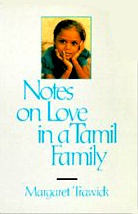|
2007 |
Enemy Lines: Warfare, Childhood, and Play in Batticaloa
(Philip E. Lilienthal Books) 2002
2002 |
Photos from the Field -"Terrorists"&
"Commonfolk"
& "Scenes" |
|
November 1999 |
Women in Combat
"....Traditionally, when there has been violent
conflict, men have been the principal fighters, because men are bigger
on the average and have stronger arms and shoulders on the average than
women. Traditionally, large bodies and strong arms and shoulders have
been necessary to wield weapons effectively. But small arms technology
has developed in such a way that one no longer needs great muscular
power to handle a modern combat rifle, or a rocket-propelled grenade
launcher, or whatever else advanced stuff is out there. The playing
field has been levelled. A troop of well trained and well armed teenaged
girls can route a battalion of big strong men who are not so very well
trained. The more so as little girls can hide in treetops more easily
than big men..."
|
|
May 1999 |
Lessons from Kokkodiacholai
"My
aim for this paper is not just to provide another recitation of the
horrors of
the war in Sri Lanka. While you should certainly know what has happened
and continues to happen there, it is more important for you to know what you
can do about it, and for you to be motivated to do it. My advice is simple.
Go there.I especially recommend that you visit the town of
Kokkaddichcholai..."
|
|
September 1996 |
Cyberspace, War & Sri
Lanka |
|
July 1996 |
Towards a Tamil Transnationalism
"Those
who identify themselves as Sri Lankan Tamils are involved simultaneously in
the globalization and the localization of Tamil culture. On the one hand, a
war is being waged for a separate Tamil homeland within the small island
currently named Sri Lanka. On the other hand, efforts are being made
throughout the world to make Tamil culture better known to, and understood
by, non-Tamil peoples, toward the end of establishing cross-cultural and
cross-national alliances. The immediate and most urgent need is to free
Tamil people remaining in Sri Lanka from the domination of a
Sinhala-controlled government that is hostile to Tamil interests, and has
been directly responsible for the deaths of many thousands of Tamil
civilians..."
|
|
July 1996 |
Open letter to
President Kumaratunga
"Time after time the LTTE has conducted surprise attacks
upon army camps, killed soldiers, and stolen weapons. Time after time,
unwary soldiers marching down the open road have been picked off by LTTE
snipers. When only a handful of soldiers gets killed, we read that the LTTE
is "harassing" the army. When the LTTE shoots a few soldiers here and a few
soldiers there, we hear that they are engaging in "the war of the flea" with
"pinprick attacks." Some flea and some pin! These soldiers are human beings
with families, bleeding their lives out in the dust. Do the families of
those dying soldiers feel nothing more than pinpricks and flea-bites? How do
the families of the soldiers at Mullaitivu feel at this moment, not even
knowing whether their own sons and brothers are alive or dead? My sister
Chandrika, how would you feel if the young men dying were your own children?
Would you have risked their becoming Tiger-bait in the first place? But this
is just what those soldiers have turned out to be: Tiger-bait..."
|
|
June 1996 |
Combatant's Position in Sri Lanka Conflict - An Account from the East |
|
May 1996 |
Focus on Sri Lanka
"...The danger to me in observing these things was not so
much physical as professional. If I speak too much about what I have seen, I
might not be allowed to return, to see and write more. To be denied the
opportunity to revisit the Tamil people whom I have grown to love would be a
greater hardship to me than to have an arm or a leg shot off. But a greater
hardship still would be to lose the ability - the courage, or the
foolishness, or whatever - to speak my mind. What to do? What to do? Such
are the painful decisions of life..."
|
|
April 1996 |
Make the Facts of the War Public
I have been struggling in my mind against the
conclusion that the SL government is trying to kill or terrorize as many
Tamil people as possible; that the government is trying to keep the
conditions of the war unreported internationally, because if those
conditions were reported, the actions of the military would be perceived
as so deplorable that foreign nations would have no choice but to
condemn them. And this would be embarrassing to everybody. But it seems
now that no other conclusion is possible.
|
|
1992 |
Notes on Love in a Tamil Family [Winner of
Ananda Kentish Coomaraswamy Book Prize, 1992 ]
 "...The
central topic of this book-in Tamil, anpu, in English, "love" is a
feeling, and my approach to the study of this feeling has been through
feeling. I have tried throughout the course of my research and writing
to remain honest, clear-headed, and open-minded, and to follow the
dictates of reason and empirical observation in my descriptions and
analyses of the events I have sought to comprehend. But I have not
attempted to be "objective" in the common sense of this term. I have
never pretended to be disinterested or uninvolved in the lives of my
informants, and I have never set my own feelings aside. Only by heeding
them have I been able to learn the lessons that I try, in this volume,
to pass on..." "...The
central topic of this book-in Tamil, anpu, in English, "love" is a
feeling, and my approach to the study of this feeling has been through
feeling. I have tried throughout the course of my research and writing
to remain honest, clear-headed, and open-minded, and to follow the
dictates of reason and empirical observation in my descriptions and
analyses of the events I have sought to comprehend. But I have not
attempted to be "objective" in the common sense of this term. I have
never pretended to be disinterested or uninvolved in the lives of my
informants, and I have never set my own feelings aside. Only by heeding
them have I been able to learn the lessons that I try, in this volume,
to pass on..."
|
|
1990 |
War and Tamil Women: A
Women's Eye-view
"Women with their
memories haunting with the sights of the distorted forms of bodies of
their beloved, but still with the responsibilities awaiting their
services as women, tending the young, the elderly, adjusting life in the
worst of living conditions, still made incomprehensible, due to
indiscriminate shelling, aerial bombing and torture. Complete
majoritarian Democracy, in countries divided on ethnic lines will never
satisfy the minority. In circumstances where the majority refuses to
come to an amicable settlement with the minorities, the minorities have
no way other than fighting for their right for self determination. Even
in such a situation the majorities are the gainers as they easily brand
these freedom fighters as "terrorists", a word often used to gain the
attention and sympathy of all the so called parliamentarians around the
world. Ultimately it is again the minorities who are the losers..."
|
 Margaret
Trawick taught Anthropology in the United States
for fourteen years before joining Massey University in 1992 as Professor of
Social Anthropology. She received her BA with high honours in anthropology
from Harvard in 1970, and her PhD in anthropology from the University of
Chicago in 1978. She has carried out four extensive fieldwork projects in
southern India, one extensive fieldwork project in Sri Lanka, and one
fieldwork project at her former home in New York State. Her publications
address the status of women in India, literate Chinese and Indian medical
systems, South Indian poetry and poetics, spirit mediumship and possession,
the anthropology of emotion, family and kinship, life histories, and the
experience of untouchability in India. Professor Trawick�s current research
is about the war in Sri Lanka.
Margaret
Trawick taught Anthropology in the United States
for fourteen years before joining Massey University in 1992 as Professor of
Social Anthropology. She received her BA with high honours in anthropology
from Harvard in 1970, and her PhD in anthropology from the University of
Chicago in 1978. She has carried out four extensive fieldwork projects in
southern India, one extensive fieldwork project in Sri Lanka, and one
fieldwork project at her former home in New York State. Her publications
address the status of women in India, literate Chinese and Indian medical
systems, South Indian poetry and poetics, spirit mediumship and possession,
the anthropology of emotion, family and kinship, life histories, and the
experience of untouchability in India. Professor Trawick�s current research
is about the war in Sri Lanka.